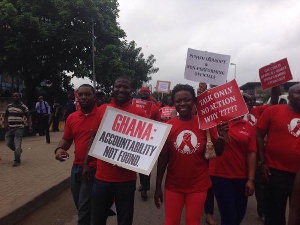The industrial action by public sector workers is set to enter a fresh week following the postponement of negotiations between workers and government to next week.
Government has since last Wednesday had continuous talks with striking labour unions to persuade them to return to their posts as their grievances, which largely centre on the release of Tier-2 pension funds, are addressed.
But workers have maintained a resolute position, forcing government to pursue legal action to compel them to return to post.
After meeting leadership of the 12 labour unions, Deputy Communications Minister Felix Kwakye Ofosu told journalists in Accra that government is willing to make concessions to see the workers return to their duties.
Negotiations, Mr. Kwakye Ofosu said, will resume on Tuesday following government’s submission of a proposal for labour’s consideration on the way forward to end the impasse.
According to him, one of the compromises government is willing to make is to withdraw the legal suit through which it seeks to compel workers to rescind their strike action.
The postponement of the talks means that the strike will enter its tenth day by the time labour unions return to the discussion table next week.
Public sector workers last Wednesday embarked on an indefinite strike over issues relating to management of Tier-2 pension funds.
The unions want government and the National Pensions Regulatory Authority (NPRA) to transfer the funds, which are currently held in the vaults of the central bank, to their own privately-chosen trusts for management.
There are four main trusts and schemes registered by the striking unions. These are the Health Service Occupational Scheme, set up by the Health Sector Workers Union; the Ghana Education Service Occupational Pension Scheme of the Ghana National Association of Teachers (GNAT); the Judicial Service Occupational Pension Scheme of the Judicial Service Staff Association of Ghana (JUSAG); and the Hedge Master Trust Occupational Pension Scheme for the Civil and Local Government Staff Association of Ghana (CLOGSAG).
The workers say government’s retention of the funds contravenes the National Pensions Act, which allows them to choose their own fund managers.
But government has also maintained that workers’ interpretation of the Pension Act is erroneous, as the Pension Act allows government, as the employer, to have a role in choosing trustees to manage the funds in question.
Government’s position has fuelled suspicions it is trying to impose a particular trustee to manage the funds, a situation the workers have rejected – thus making it the main dispute that needs to be addressed before they return to post.
According to Mr. Kwakye Fosu, government’s new proposal to the labour unions addresses some of the workers’ concerns surrounding the imposition of a particular pension fund manager on them. More than 10 unions are embarking on the widespread public sector strike. The groups include the Health Service Workers Union (HSWU), Ghana Registered Nurses’ Association (GRNA), Ghana Medical Association (GMA), Ghana Physician Assistants’ Association (GPAA), Ghana Pharmacists Association (GHOSPA), and the Ghana Association of Certified Registered Anesthetists (GRCRA).
Others include the Ghana National Association of Teachers (GNAT), Teachers and Educational Workers Union (TEWU), National Association of Graduate Teachers (NAGRAT), Coalition of Concerned Teachers (CCT), Judicial Service Staff Association of Ghana (JUSAG), and the Civil and Local Government Staff Association of Ghana (CLOGSAG).
The Trades Union Congress, which is made up of 18 affiliated public and private sector unions, has backed the workers’ strike.
General News of Friday, 31 October 2014
Source: BFT













